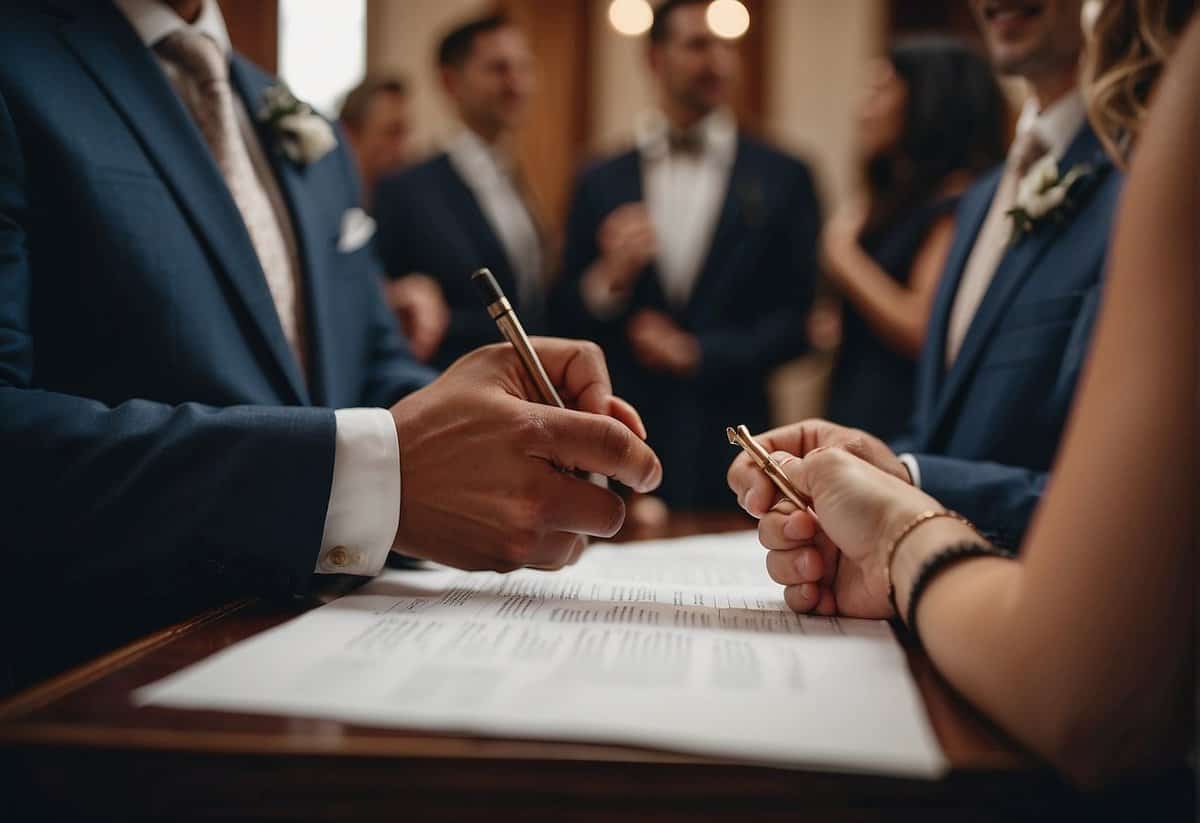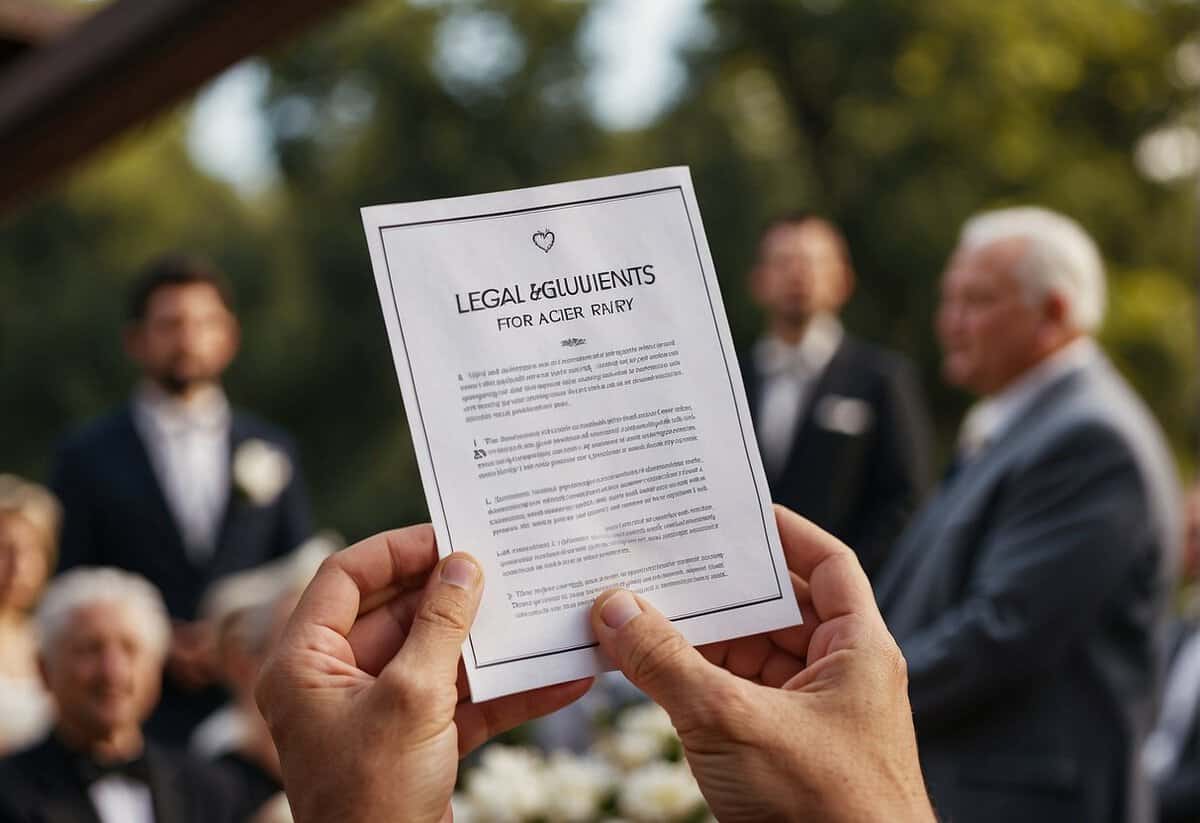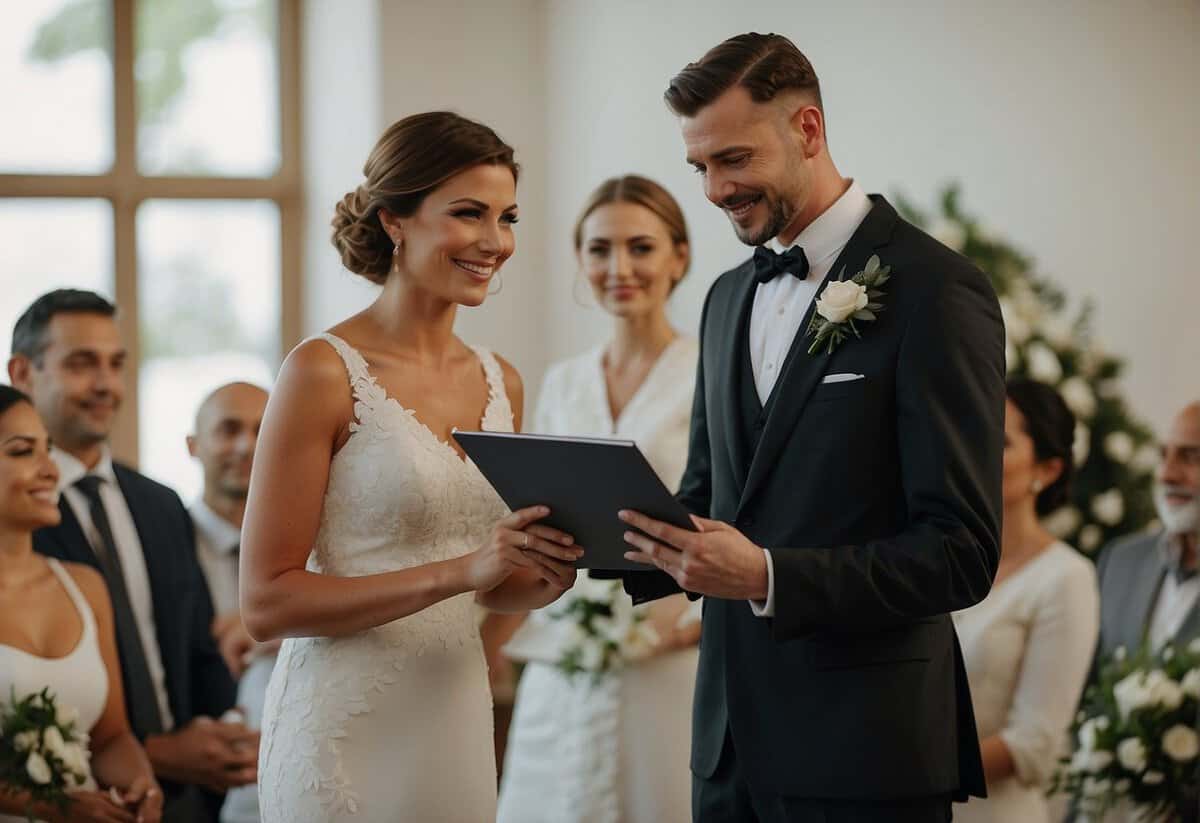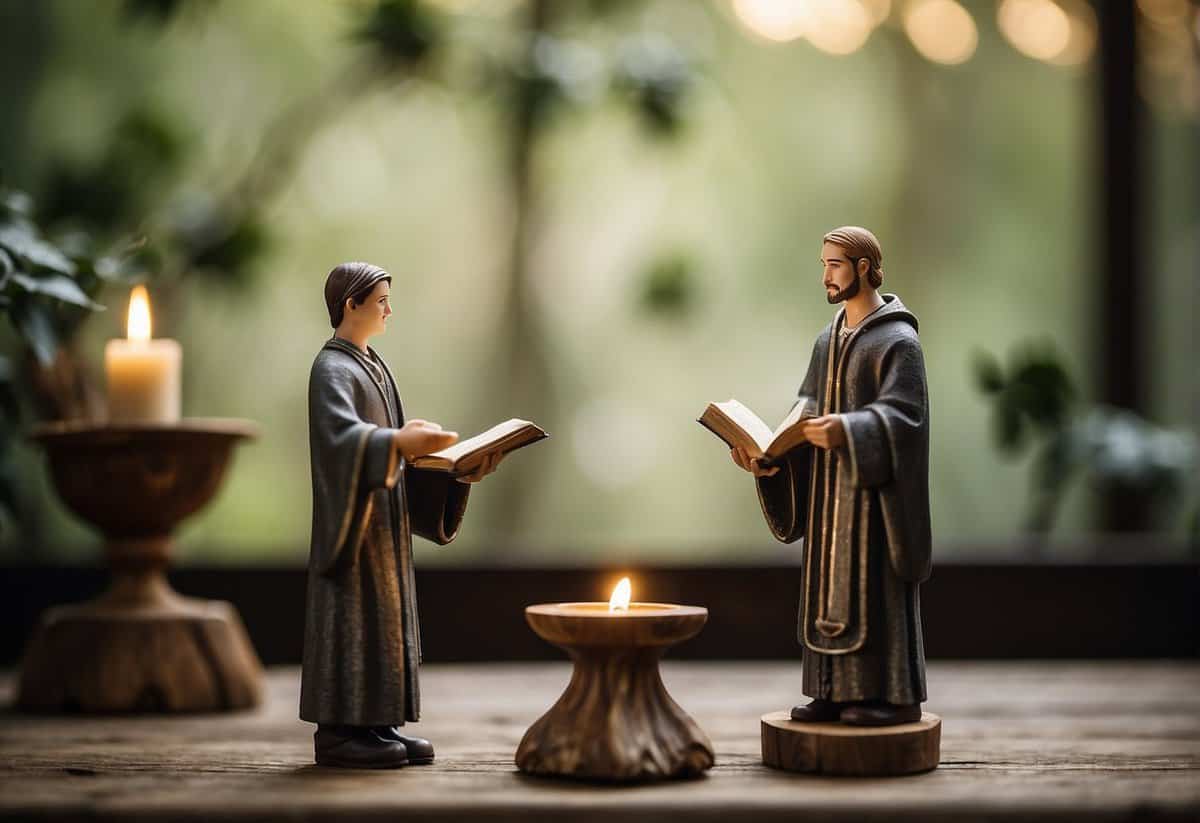Can a Friend Legally Marry You? Understanding the Rules of Designated Officiants
Deciding who will officiate your wedding ceremony is a significant choice that can add a personal touch to your big day. You might be considering asking a friend to take on this role to make the ceremony more intimate and unique. You can have a friend or family member officiate your wedding, but there are a few important legal requirements that need to be satisfied to ensure that your marriage is recognized by the state.

States vary in their requirements for who can legally perform a wedding ceremony. While judges, justices of the peace, and licensed celebrants are commonly recognized as legal officiants, many states also permit friends or relatives to officiate weddings, provided they obtain proper ordination. Ordination often involves a simple online process through organizations that are recognized across various states. However, it’s crucial to check the specific rules in the state where the wedding will take place.
When a friend agrees to officiate your wedding, they’re taking on a role that includes both ceremonial and legal responsibilities. Not only will they craft and conduct the ceremony, but they must also ensure that the marriage license is correctly filled out and returned to the local county clerk within the required timeframe. This final step solidifies the marriage as a legal union. Choosing the right friend as your officiant involves considering their ability to perform these duties with the seriousness and attention to detail required.
Key Takeaways
- Friends can officiate weddings if they meet state-specific legal requirements.
- Anyone officiating must be properly ordained and ensure the marriage license is legally processed.
- The right friend as an officiant is someone who understands both the ceremonial and legal responsibilities.
Legal Requirements for Officiants

Before a friend or family member officiates your wedding, they must navigate a series of legal steps to ensure the marriage is recognized. This guide will walk you through state-specific regulations, the process of ordination and registration, and the final step of performing the ceremony.
State-Specific Regulations
Each state has unique requirements that officiants must follow to legally conduct a wedding. For example, some states mandate that an officiant be an ordained minister or hold a certain type of public office, while others have more flexible rules. You’ll need to check the state marriage laws to understand the specifics. A marriage license obtained by the couple is separate but related to officiant requirements and is also essential for a valid marriage.
Ordination and Registration
In many cases, becoming an ordained minister is necessary to officiate a wedding. Organizations such as the Universal Life Church offer online ordination, which most states recognize. However, some states require that officiants also register with local authorities. This may involve submitting an application, providing ordination credentials, or even appearing in person. Details for officiant registration by state can provide guidance.
Performing the Ceremony
After navigating the legal requirements and ensuring registration is complete, an officiant can perform the wedding ceremony. Specific requirements often include stating certain words or fulfilling particular actions to authenticate the ceremony legally. It’s also vital to sign and return the marriage license to the issuing office in compliance with local laws. Information on the correct procedure can often be found in resources about performing weddings.
How to Get Ordained

If you’re looking to officiate a wedding for a friend or loved one, getting ordained is a necessary step. Online ordination is a widely accepted and accessible option, with organizations such as the Universal Life Church and American Marriage Ministries offering the service. Let’s explore how you can become an ordained minister online and ensure your ordination is recognized legally.
Online Ordination Options
Numerous nonprofit organizations provide online ordination services that are quick and often free. Among these, the Universal Life Church and American Marriage Ministries stand out as popular choices. Here’s how to get started:
- Research: Look for reputable organizations that can ordain you online. Ensure they are recognized in the state where you’ll be performing the marriage.
- Apply: You’ll need to fill out an application providing some personal information and, in most cases, declare your intent to abide by the organization’s tenets.
- Ordination: After application approval, you will be ordained. This can typically be done in minutes and may allow you to officiate weddings almost immediately.
Legal Standing of Online Ordinations
The legality of online ordinations depends on the location. Most states in the U.S. recognize online ordination, but it’s your responsibility to ensure compliance with local laws. For instance, some states may require:
- Registration with a government office
- Additional documentation from the ordaining organization
- A fee for registration or licensing
Before performing a ceremony, always check state and county laws where the wedding will take place.
Required Documentation
After you are ordained, you may need to present an ordination certificate when registering with local authorities. Here is what you might need:
- Ordination Certificate: This is provided by the ordaining organization, like the Universal Life Church. It serves as proof of your ordination.
- Letter of Good Standing: Sometimes required, this letter vouches for your standing within the organization.
- Government Forms: Some locales have specific forms you’ll need to complete as part of the official recognition process.
By getting ordained online and securing the proper documentation, you can legally officiate a wedding and create a memorable experience for the couple. Remember to research thoroughly and abide by your state’s regulations to ensure the marriage ceremony you conduct is legally binding.
Roles and Responsibilities of an Officiant

When you’re entrusted with officiating a wedding, your role is pivotal in both the legality and emotional resonance of the ceremony. It’s about ensuring that the couple’s union is officially recognized and that their vision for their special day is realized.
Preparation for the Ceremony
Before the wedding day arrives, it’s your job to:
- Meet with the couple to discuss their desires for the ceremony, including any specific readings, vows, or traditions they want to include.
- Craft a personalized ceremony script that reflects the couple’s relationship and aspirations for their future together.
- Understand and comply with local laws to ensure the marriage can be legally performed.
Conducting the Wedding
During the ceremony itself, you will:
- Lead the wedding rehearsal, typically held one or two days before the wedding, to practice the sequence of events and flow of the procession.
- Ensure a smooth transition between different parts of the ceremony, such as readings or exchanging of vows.
- Officially perform your marriage ceremony, which includes pronouncing the couple as legally married.
Post-Ceremony Duties
After the ceremony, your responsibilities include:
- Signing the marriage license with the appropriate witnesses. This is the legal document that validates the marriage.
- Filing the marriage license with the local registrar’s office, if this is required in your jurisdiction.
Remember, your responsibilities are a blend of legal obligations and personal touches that make the wedding memorable.
Choosing the Right Friend as Your Officiant

When you’re considering a friend or family member to officiate your wedding, start by thinking about their personality and how it pairs with your vision for the ceremony. Qualities to consider include:
Public Speaking Skills: Your officiant should be comfortable speaking in public. They’ll need to confidently address your guests and lead the ceremony.
Legal Ability to Officiate: Make sure they can legally officiate a wedding in your state. Often, a simple online ordination process is sufficient.
Familiarity with You as a Couple: A friend who knows your story can add a personal touch that a professional officiant might not provide.
Comfort with Ceremony Duties: Verify they are at ease with the responsibilities, such as signing and handling the marriage license.
Consideration Table
| Consideration | Description | Why It Matters |
|---|---|---|
| Personality Match | Align their temperament with your ceremony style. | A misalignment can affect the ceremony’s atmosphere. |
| Legality | Confirm their ability to perform a legal wedding. | Without legal authority, your marriage may not be recognized. |
| Emotional Connection | Choose someone who genuinely celebrates your union. | Adds sincerity and warmth to your ceremony. |
| Dutifulness | Ensure they understand the role’s obligations. | Proper execution of legal and ceremonial duties is essential. |
Your chosen officiant doesn’t need to be a member of the clergy or a seasoned professional officiant, but they should exemplify an inclusive and respectful approach to officiate weddings. Consider these aspects carefully, and you’ll find a friend who can not only lead your ceremony with love but will also ensure that everything is valid and binding.
Frequently Asked Questions

Navigating the legalities of having a friend or family member officiate your wedding can seem daunting, but gaining the right information will make the process straightforward.
What qualifications are needed for someone to officiate a wedding?
Traditionally, judges, magistrates, and religious leaders have the authority to officiate weddings. However, if a friend or family member wishes to perform the ceremony, they typically need to get ordained, often achievable through various organizations online.
How can you have a friend or family member officiate your wedding?
To have a friend or family member officiate your wedding, they will need to get ordained through an online service or organization authorized to confer this ability.
What are the legal requirements for someone to marry a couple in California?
In California, anyone wishing to perform a wedding must be legally ordained or deputized specifically for the ceremony. State and county-specific registration may be necessary to have the authority recognized.
Can a lawyer be authorized to officiate a wedding ceremony?
A lawyer does not automatically have the authority to officiate a wedding. They would need to follow the same processes as anyone else, such as becoming legally ordained or authorized by the state where the wedding will take place.
What steps must be taken to legally officiate a wedding in New York State?
In New York, one must register with the city clerk and become an ordained minister or otherwise authorized individual to legally officiate a wedding.
What documentation is necessary to officiate a wedding in Washington state?
To officiate a wedding in Washington state, one needs to provide proof of ordination and may be required to register with the state or county, depending on local regulations. It’s essential to review and adhere to local policies.
